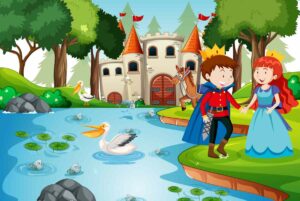Bedtime is a special time of day when parents and children bond over stories. What better way to make this time even more meaningful than by sharing bedtime moral stories with your little ones? Not only will these stories entertain, but they will also teach important life lessons that will stay with them for years to come.
What are Moral Stories?
Moral stories are tales that teach a lesson or convey a moral value. These stories often have a protagonist who faces challenges and overcomes them through the application of certain values like courage, honesty, and kindness.
Why are Moral Stories Important for Children?
Children are at a critical stage in their lives where they are learning about their place in the world and developing their values. Moral stories help children understand the importance of positive behaviours and values like honesty, kindness, and respect for others.
Examples of Bedtime Moral Stories
| Title | Moral Lesson |
|---|---|
| The Lion and the Mouse | Even the smallest of creatures can be helpful in times of need. |
| The Boy Who Cried Wolf | Honesty is always the best policy. |
| The Tortoise and the Hare | Slow and steady wins the race. |
Tips for Making Bedtime Stories Meaningful
- Choose stories that are appropriate for your child’s age and level of understanding.
- Encourage your child to ask questions and discuss the story with you.
- Relate the story to real-life situations to help your child understand how the moral lesson applies to them.
- Make the storytelling experience interactive by using different voices and sound effects.
Overall, bedtime moral stories are a wonderful way to help children understand important values and life lessons. By sharing these stories with your kids, you can create a special bond and instil important values that will last a lifetime.
Educational Moral Stories for Learning
Education is not only about academic knowledge but also about character building. One of the most effective ways to instil values and life lessons is through educational moral stories. These stories are not only entertaining but also leave a lasting impact on the readers’ minds.
Here are some examples of educational moral stories:
| Title | Summary |
|---|---|
| The Honest Woodcutter | A woodcutter loses his axe in a river and an angel appears to him and offers three axes, one made of gold, silver and iron, and rewards him for his honesty. |
| The Ant and the Grasshopper | A hardworking ant saves food for winter while a lazy grasshopper does not. The grasshopper learns a valuable lesson when it’s too late. |
| The Lion and the Mouse | A small mouse helps a mighty lion, who spares his life later when the mouse is in danger. |
These stories not only impart valuable insights but also help readers enhance their English proficiency. They are suitable for both children and adults and can be incorporated into educational settings to promote learning outside of the classroom.
Through these educational moral stories, readers can learn important values such as honesty, hard work, kindness, and compassion. They provide the perfect platform to teach life lessons in English, making learning enjoyable and effective.
So, take the time to read and share these educational moral stories with your loved ones, and watch as they learn and grow through the timeless wisdom they impart.
Fables and Moral Stories for All Ages
Fables are timeless tales that have been enjoyed for generations. These stories often feature animals as characters and convey important moral lessons that are just as relevant today as they were centuries ago. Whether you’re a child or an adult, fables and moral stories can offer valuable insights into life and the human experience.
Why Are Fables and Moral Stories Important?
Fables and moral stories can provide several benefits for readers:
- Entertainment: Fables and moral stories are often entertaining and engaging, offering readers a chance to escape into a world of imagination.
- Valuable Lessons: These stories contain important moral lessons that can help readers make positive changes in their lives.
- Universal Appeal: Fables and moral stories are enjoyed by readers of all ages and can provide valuable insights into the human experience.
Best Fables and Moral Stories
| Title | Author | Moral Lesson |
|---|---|---|
| The Tortoise and the Hare | Aesop | Slow and steady wins the race |
| The Boy Who Cried Wolf | Aesop | Honesty is the best policy |
| The Ant and the Grasshopper | Aesop | Hard work pays off |
| The Lion and the Mouse | Aesop | Even the smallest act of kindness can be repaid in a big way |
| The Fox and the Grapes | Aesop | It’s easy to despise what you cannot have |
These are just a few examples of the many fables and moral stories that have been passed down through the ages. Whether you’re looking for a story to entertain your child or a tale to inspire personal growth, fables and moral stories are valuable resources for all ages.
Inspirational Stories of Triumph and Overcoming Challenges
Life is full of challenges, but how we deal with them can determine our success or failure. Inspirational stories of triumph and overcoming challenges remind us that it’s possible to overcome obstacles and achieve greatness. These stories are a testament to the human spirit and the power of perseverance.
Encouraging stories of triumph can inspire us to push through our difficulties and keep going, no matter how tough things may seem. By learning from the experiences of others, we can gain the strength and motivation we need to face our challenges.
“Success is not final, failure is not fatal, it’s the courage to continue that counts.” – Winston Churchill
One inspiring story is that of Oprah Winfrey, who grew up in poverty and faced numerous obstacles in her life. Despite these challenges, she persevered and went on to become a successful media personality, philanthropist, and entrepreneur. Her story is a reminder that no matter where we come from or what challenges we face, we can achieve our dreams if we stay focused and work hard.
Another example is the story of J.K. Rowling, who faced numerous rejections before finding success with the Harry Potter series. Her perseverance and dedication to her craft paid off in the end, and she is now one of the most successful authors in the world. Her story is a reminder that success often comes after many failures, and it’s important to keep pushing forward.
Lessons from Inspirational Stories
Inspirational stories of triumph and overcoming challenges offer valuable lessons that can be applied to our own lives. Some of these lessons include:
- The importance of perseverance and determination in the face of adversity
- The power of positivity and a can-do attitude
- The value of hard work and dedication
- The need to take risks and step outside our comfort zones
- The importance of believing in ourselves and our abilities
By learning from these lessons and applying them to our own lives, we can overcome our obstacles and achieve our goals.
Inspiring Others with Our Own Stories
Finally, it’s important to remember that we all have our own inspiring stories to share. Whether it’s overcoming a personal challenge or achieving a long-held dream, our experiences can inspire others to push through their difficulties and achieve their goals.
By sharing our stories with others, we can create a community of support and encouragement that can help us all succeed. So don’t be afraid to share your own story of triumph and perseverance – you never know who you might inspire.
Engaging Moral Stories for Children
Children’s stories are imaginative and fun, but they can also teach important lessons in a way that captivates young readers. These moral stories for kids combine creativity and education, providing a valuable resource for parents and educators alike.
Examples of Moral Stories for Kids
Here are some examples of popular moral stories for children:
| Moral Story | Lesson |
|---|---|
| The Ant and the Grasshopper | The importance of hard work and planning for the future |
| The Boy Who Cried Wolf | The importance of honesty and integrity |
| The Tortoise and the Hare | The value of perseverance and determination |
These stories provide valuable lessons for children in an entertaining and engaging format. They can help children learn important life skills while sparking their imagination and creativity.
Benefits of Moral Stories for Kids
Reading moral stories can have a positive impact on a child’s development. They can:
- Teach important values and morals
- Encourage empathy and understanding
- Improve language skills and vocabulary
- Spark creativity and imagination
- Foster a love of reading and learning
By incorporating moral stories into a child’s reading routine, parents and educators can help nurture a child’s character and encourage a lifelong love of learning.
Life Lessons in Engaging English Short Stories
English short stories offer a unique blend of entertainment and education. They have the power to captivate readers while providing valuable life lessons. Short stories in English can be an effective tool for improving language skills and learning about different cultures.
One of the most significant benefits of short stories is the ability to convey profound life lessons in a concise format. Many short stories use symbolism and metaphors to explore complex themes and offer valuable insights into human behaviour. These stories can teach us about love, loss, courage, and perseverance, among other things.
Example of a Short Story in English that Teaches a Valuable Life Lesson
“The Necklace” by Guy de Maupassant is a classic short story that illustrates the dangers of greed and the importance of being true to oneself. The story follows a woman who borrows a necklace to wear to a party, only to lose it and spend years paying off the debt to replace it. In the end, she discovers that the necklace was a fake, and her entire life has been a waste.
This story teaches us that material possessions do not bring true happiness and that we should be content with what we have. It also warns us about the dangers of living beyond our means and the consequences of dishonesty.
Short Stories in English for Language Learners
Short stories in English can also be an excellent resource for language learners. They provide an opportunity to practice reading, comprehension, and grammar skills in a fun and engaging way. Many short stories come with vocabulary lists and discussion questions to enhance comprehension and encourage critical thinking.
Reading short stories in English can help learners improve their language skills and gain a deeper understanding of the language’s nuances. It can also expose them to different writing styles and literary techniques.
Moral Stories for Adults – Lessons for the Grown-ups
Moral stories are not just for children; they can be equally relevant for adults. Moral stories that address adult issues can be especially powerful and thought-provoking. They can provide valuable insights into the complexities of adult life and offer guidance on how to navigate challenging situations.
One example of such a story is “The Two Wolves,” a Native American legend that teaches about the battle between good and evil within ourselves. The story goes:
An old Cherokee is teaching his grandson about life. “A fight is going on inside me,” he said to the boy. “It’s a terrible fight and it’s between two wolves. One is evil – he is anger, envy, sorrow, regret, greed, arrogance, self-pity, guilt, resentment, inferiority, lies, false pride, superiority, and ego. The other is good – he is joy, peace, love, hope, serenity, humility, kindness, benevolence, empathy, generosity, truth, compassion, and faith. The same fight is going on inside you – and inside every other person too.”
The grandson thought about it for a minute and then asked his grandfather, “Which wolf will win?” The old Cherokee simply replied, “The one you feed.”
This story can help adults reflect on the choices they make in life and the impact those choices have on their well-being and the well-being of those around them. It emphasizes the importance of cultivating positive qualities within ourselves and making conscious decisions to feed the “good wolf.”
Another example is the story of “The Stonecutter,” a classic Chinese tale that teaches about the dangers of constantly striving for more. The story goes:
Once upon a time, there was a stonecutter who was dissatisfied with his simple life. He wished he could be a wealthy merchant, so a fairy granted his wish. Soon he was living in a grand house with servants and riches beyond his wildest dreams.
But the stonecutter soon grew tired of this life and wished he could be a powerful government official. So the fairy granted his wish, and he became a high-ranking official with great power and influence.
But again, the stonecutter soon grew dissatisfied and wished he could be a powerful king. So the fairy granted his wish, and he became a king with absolute power over all his subjects.
But even as a king, the stonecutter was not content. He wished to be more powerful than nature itself. So the fairy granted his wish and turned him into a mountain. Finally, the stonecutter was happy, for he was now the most powerful thing in the world.
But one day, a stonecutter came along and began to chisel away at the mountain. The stonecutter was not impressed by the mountain’s power or majesty; he simply saw it as a stone to be shaped and carved.
The former stonecutter realized that there was always someone more powerful than him, and that true happiness came from accepting one’s place in the world and finding contentment in simple pleasures.
This story can help adults reflect on the dangers of constantly striving for more and the importance of finding contentment and joy in the present moment.
Benefits of Reading Moral Stories as an Adult
Reading moral stories as an adult can have many benefits, including:
- Gaining new perspectives on complex issues
- Developing empathy and compassion
- Learning valuable life lessons
- Stimulating critical thinking and reflection
- Improving communication skills
- Reducing stress and promoting relaxation
- Expanding vocabulary and improving language skills
Overall, moral stories for adults have the power to inspire, educate, and transform. They offer a unique opportunity for personal growth and can help us navigate the complexities of adult life with wisdom and grace.
The Role of Moral Stories in Nurturing Empathy
Moral stories play a vital role in nurturing empathy, one of the essential qualities in today’s society. Children who grow up with an understanding of empathy are more likely to be compassionate and considerate towards others. As such, incorporating moral stories in childhood education can help children develop empathy and become responsible citizens.
Educational moral stories provide a safe and nurturing environment for children to explore emotions and understand the perspectives of others. By reading about different characters’ experiences and feelings, children can develop empathy and learn to relate to others better. Additionally, moral stories can help children understand the consequences of their actions and make better choices in life.
The Benefits of Moral Stories in Nurturing Empathy
Moral stories provide numerous benefits in nurturing empathy in children. Here are some of the key benefits:
| Benefits | Explanation |
|---|---|
| Develops emotional intelligence | Moral stories provide a platform for children to develop emotional intelligence by exploring the feelings and emotions of different characters. |
| Helps children understand different perspectives | By reading about different characters’ experiences and feelings, children can develop an understanding of different perspectives and learn to relate to others better. |
| Fosters compassion | Moral stories can help children understand the consequences of their actions and develop compassion towards others. |
| Promotes responsible citizenship | Empathetic children are more likely to become responsible citizens who can contribute positively to society. |
Moral stories play a critical role in nurturing empathy in children. By incorporating educational moral stories into our lives, we can create a more compassionate and empathetic society.
The Art of Crafting Engaging Moral Stories
Creating an engaging moral story is an art that requires careful consideration and skill. The story must be compelling and resonate with the reader, while effectively delivering its intended message. Here are some key elements to keep in mind when crafting an engaging moral story:
1. Choose a relatable topic
The topic of the story should be relevant to the reader and relatable to their experiences. This helps to make the story more engaging and relatable, as the reader can connect with the characters and the situations they face.
2. Develop interesting characters
Compelling characters is essential for an engaging story. Characters should be well-developed, with distinct personalities and motivations. This helps readers to connect with the characters and care about what happens to them.
3. Use descriptive language
Descriptive language helps to create a vivid picture in the reader’s mind, making the story more engaging and immersive. Using sensory language that appeals to sight, sound, touch, and smell can help bring the story to life.
4. Create a clear message
The moral of the story should be clear and concise, without being too heavy-handed. The message should be woven into the story in a way that feels natural and organic, rather than forced or preachy.
5. Use a memorable ending
The ending of the story should leave a lasting impression on the reader. A memorable ending can help to drive home the message of the story and leave readers with something to think about.
“A good story should make you laugh, make you cry, and leave you with something to ponder long after the final page has been turned.” – Joseph Heller
A well-crafted moral story can have a powerful impact on the reader, inspiring them to reflect on their values and make positive changes in their lives. By following these tips, you can create engaging moral stories that resonate with readers of all ages.
Inspiration Through Moral Stories
Moral stories have the power to inspire and encourage readers of all ages. These stories offer valuable life lessons and insights that readers could apply in their daily lives. The impact of inspirational stories can be profound, and readers can find inspiration and motivation in them.
Reading uplifting and encouraging stories can have a positive effect on mental health, increasing happiness and reducing stress. It also boosts creativity and imagination, providing a healthy escape from the rigours of daily life.
“The purpose of a storyteller is not to tell you how to think, but to give you questions to think upon.” – Brandon Sanderson
Reading inspiring stories also helps readers develop a growth mindset, enabling them to approach challenges with a positive attitude and overcome obstacles in their path. The lessons learned from these moral stories can help readers cultivate a more resilient and determined outlook towards life.
Through moral stories, readers can also learn about empathy and compassion. Stories can enable readers to understand the perspectives of others and help to promote social and emotional learning.
Benefits of Inspirational Stories
The benefits of reading inspirational and encouraging stories can include:
- Mental health improvement
- Increased happiness
- Stress reduction
- Enhanced creativity and imagination
- Growth mindset development
- Improved resilience and determination
- Social and emotional learning
- Increased empathy and compassion
Find Your Inspiration
There are many sources of inspirational stories, including books, websites, and podcasts. Finding a story that resonates with you and your goals can have a profound impact on your life.
Whether you’re seeking personal growth, motivation to overcome challenges, or simply looking for an enjoyable read, inspirational stories can provide a wealth of benefits. Start your journey towards inspiration today, and discover all that moral stories have to offer.
The Role of Moral Stories in Nurturing Empathy
Moral stories have been used for generations to teach important values and lessons to children. However, their impact goes beyond just teaching right from wrong; they have the power to nurture empathy and compassion in young readers as well. By presenting relatable characters and situations, moral stories can help children understand and connect with others who may have different backgrounds or experiences from their own.
Moral stories for children and kids can offer a unique opportunity to explore ideas of fairness, kindness, and respect through the eyes of characters who may be very different from them.
Studies have shown that children who are exposed to moral stories from a young age develop greater levels of empathy and compassion towards others, as well as an increased ability to understand and regulate their own emotions. This is a vital skill for children to learn as they navigate through their social and emotional development.
“Moral stories can provide a framework for children to develop a sense of right and wrong, while also learning how to relate to and empathize with others who may have different experiences or backgrounds from their own.”
| Benefits of Moral Stories for Children | Moral Stories for Kids |
|---|---|
| Teaches important values and life lessons | Strengthens emotional intelligence and empathy |
| Enhances language and cognitive development | Encourages critical thinking and problem-solving |
| Helps children understand social expectations and norms | Bolsters self-esteem and confidence |
Moral stories can be especially impactful for children who may not have opportunities to interact with diverse groups of people and learn about different cultures and ways of life. By presenting characters from various backgrounds and experiences, moral stories can help children develop a sense of empathy and understanding towards those who may be different from themselves.
Using Moral Stories to Nurture Empathy
There are many ways to use moral stories to nurture empathy in children. Parents and teachers can encourage children to think about the perspectives of different characters, and how their actions might impact others. They can also ask open-ended questions to spark discussion and encourage children to think critically about the story’s themes and messages.
- What do you think the character was feeling in this situation?
- Can you think of a time when you have felt the same way?
- What do you think the character could have done differently to help solve the problem?
Moral stories for children and kids can be a valuable tool for nurturing empathy and compassion, helping children to understand and appreciate the perspectives of others from different backgrounds and experiences.
Incorporating English Story into Everyday Life
Moral stories offer valuable life lessons that can be applied to real-world situations. Here are some tips on how to incorporate moral stories into everyday life:
- Read aloud to your kids regularly at bedtime or during family time. Choose age-appropriate stories with valuable moral lessons to help them develop empathy, compassion, and ethical values.
- Share moral stories with friends and family during gatherings or social events. Discuss the lessons learned and how they relate to current events or personal experiences.
- Use moral stories as a tool for teaching in educational settings. Incorporate them into lesson plans or assign them as homework for students to read and reflect on.
- Make a habit of reading moral stories for personal growth and reflection. Choose stories that resonate with your values and goals, and apply the lessons learned to your daily life.
By incorporating moral stories into our daily routines, we can enhance our understanding of important values and life lessons. English stories for kids are a great resource for learning and personal growth, and they can have a positive impact on our lives.
We have explored a diverse range of engaging moral stories in English that offer valuable life lessons for readers of all ages. From short moral stories to fables, bedtime stories, and educational moral stories, we’ve covered it all.
The Power of Moral Stories
We’ve seen how moral stories have the power to inspire, motivate, and teach important values. Whether you’re a child or an adult, there’s always something to learn from these timeless tales.
Incorporating Moral Stories into Our Lives
We’ve also discussed practical tips on how to incorporate moral stories into our daily lives. Reading moral stories regularly can help us grow as individuals and improve our empathy and compassion towards others.
The Art of Crafting Engaging Moral Stories
We’ve explored the art of crafting captivating moral stories that deliver their intended messages effectively. Writing moral stories requires skill and creativity, and we’ve learned how to create stories that resonate with readers.
By incorporating moral stories into our lives, we can inspire, learn, and grow as individuals. So, let’s start reading and sharing these stories with our loved ones toda








